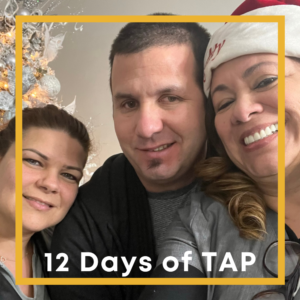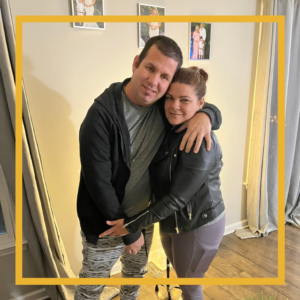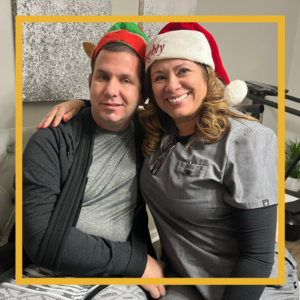Today brings a message from TAP’s program manager, Olivia Herrmann.
Client Story news and reviews
Today brings a message from TAP’s program manager, Olivia Herrmann.
Today’s story was written by a caregiver of someone with primary progressive aphasia (PPA):
In the fall of 2020, my spouse, Karen, started to complain about losing words – which we both initially attributed to “aging” coupled with the stress of the first year of the pandemic. But as the months passed, it was clear that something wasn’t quite right. Like many folks before us, we entered what felt like a lengthy phase of medical appointments and testing, only to one day be told that Karen has Primary Progressive Aphasia. Fortunately, before leaving the UNC neurologist’s office that day that we received the diagnosis, she handed us a brochure for TAP and said, “You need to contact this group. They’re great.”
I can’t overstate the importance of the Triangle Aphasia Project. We were able to set up a consultation with Maura Silverman in fairly short order and within a couple of weeks of that meeting we attended – along with a number of good friends – the “Learning to Speak Aphasia” webinar. Maura and the TAP team also provided us with additional information and pointed both of us to helpful resources. We connected with SLP Abbe Simon, who has been working with Karen and me for over a year now. And Abbe then connected me with the TAP Care Partners Group where I’ve received much-needed support as well.
I learned very quickly after Karen’s diagnosis that I was in over my head just trying to understand PPA, let alone how to be a helpful spouse as Karen and I navigate this journey together. I’ve stumbled a lot, but the support of others in the TAP Care Partners Group helps me enormously. I not only learn a lot from others in the group, but I don’t feel so alone. I’m grateful every day for the resources that TAP provides!
Jorge Salazar developed aphasia because of a brain tumor. Following his aphasia diagnosis, he had to retire from his job, making him realize the significant impact aphasia was having on his life.
Upon introduction to TAP by a speech therapist, Jorge started participating in both Spanish and English groups. He attests that TAP has been immensely beneficial, especially since he no longer has a job to attend, leaving his family as his primary communication circle. Recognizing the need to work on his speaking and writing skills, TAP groups provide him with the opportunity to practice. Jorge can see positive changes in both him and those around him at TAP groups.
Jorge Salazar desarrolló afasia a causa de un tumor cerebral. Debido a su diagnóstico de afasia, tuvo que retirarse de su trabajo, lo que le hizo darse cuenta del importante impacto que la afasia estaba teniendo en su vida.
Su terapista de lenguaje lo refirio a TAP y Jorge comenzó a participar en grupos tanto en español como en inglés. Él da fe de que TAP ha sido inmensamente beneficioso, especialmente porque ya no tiene un trabajo al que asistir, y su familia era lo unico que tenia como fuente de comunicación. TAP le brinda la oportunidad de practicar sus habilidades de expresion oral, escrita y de socializacion. Jorge reconoce que ha visto una gran mejoria y cambios positivos no tan solo en el, pero tambien en sus companeros de los grupos TAP.
Timothy (Tim) Coleman lives in Durham and loves to read comic books and play video games. He earned a bachelor’s degree in biology from North Carolina Central University (NCCU).
Tim experienced a hemorrhagic stroke in 2015 while in his 30s, which made talking very difficult for him. He is happy to say that TAP has improved his talking skills, particularly because he has been able to meet and converse with others also experiencing aphasia. Tim regularly attends two virtual groups (TAP into Movies and TAP into Memories). He encourages other people with aphasia to reach out to TAP so that they, too, can find specific groups they enjoy being a part of to rebuild their communication “competency”.
Sarah Mazeika is TAP’s newest group leader. While relatively new to the triangle area, Sarah has quickly realized the impact that TAP has on the North Carolina aphasia community. She values TAP’s emphasis on the life participation approach, a principle that she emphasizes in her clinical practice.
Sarah thoroughly enjoys leading her Friday in-person Conversations and Connections group and looks forward to co-facilitating the new in-person TAP into Recreation group at Jaycee Community Center in Raleigh, which she will co-facilitate with a licensed recreational therapist starting on Friday, January 12th. We are so happy to have Sarah involved!
John Sams lives in Apex with his lovely wife, Phyllis, and enjoys spending time with his children and grandchildren. John is a retired salesman, a talented artist, and a gardener.
John was diagnosed with mild cognitive impairment (MCI) four years ago with his primary deficit being language difficulties. He shares that there was not a time-specific event that he can pinpoint when his language became more difficult. He is happy to be associated with TAP because it provides opportunities to practice conversation with others and implement the skills learned in speech therapy in a community-setting. John attends the virtual TAPLinks/PPA Group on Wednesdays with his wife and the virtual TAP into the Bible group, as well as the in-person Conversation and Connections group. John wants other people to know that the more you do, the more opportunities you have to improve!
Mike Strickland lives in Wendell with his wife, Angie, and daughter, Lillie. He owns a stained glass studio where he currently works as an artist. Mike is a big college football fan (shout out to the Wolfpack!) and is extremely hard working.
Following knee surgery, Mike experienced an ischemic stroke on May 9th, 2023, resulting in aphasia and apraxia of speech (AOS). Despite changing many things in his life, Mike has identified blessings to come from his stroke, including meeting new people who have helped him along the way. Mike regularly attends the in-person Wake Forest, Conversation and Connections, Write On and TAP into Literacy groups. Mike wants other people with aphasia to know that every day they should decide to keep going because there’s always something to learn and progress can always be made.
Bill Swartley lives in Apex with his wonderful wife, Kay. He is a retired forest hydrologist and one of the biggest Penn State fans out there!
Bill was diagnosed with primary progressive aphasia (PPA) in 2021. He shares that he has learned effective strategies from other TAP members to improve his ability to communicate with his loved ones. Bill regularly attends the virtual TAPLinks/PPA Group on Wednesdays with his wife, as well as the in-person Conversation and Connections group on Fridays at the TAP Home Office. Bill wants other people with aphasia to continue to socialize and never stop having conversations with people.
Andrea is a TAP client who had her stroke right after the birth of her second child. She shares that depression hit hard during those first two years – whether due to postpartum depression or the impact of aphasia, she doesn’t know.
Andrea discovered TAP after moving from Arizona to Cary, where she was welcomed with open arms. She now has friends unlike she’s ever had, who she can lean on for support through the good times and the bad. Her world before vs after TAP is night and day. And of course, she wishes you happy holidays!
Jeff Fosburg is a retired electrician for General Motors. He had a stroke in February 2022 which resulted in both aphasia and apraxia of speech (AOS). Jeff was and still is an avid bike rider and loves Michigan Sports (Go Lions!).
Jeff shares that TAP feels like a family to him. He regularly attends four different virtual groups: TAP into Sports, Conversation and Connections, TAP into the Bible and more recently the joint virtual group with the Ohio State University Aphasia Initiative – all of which he loves. Jeff wants other people with aphasia to remember that they are not alone in their journeys and emboldens them to find an organization like TAP to feel better connected.
Eric Cotton is a 23-year-old college athlete who suffered a traumatic brain injury (TBI) when he was hit by a car while skateboarding in January 2023. Eric is a huge fan of sports, highly relational and a man of faith.
Eric shares that his accident took a lot away from him, but that TAP has re-introduced many positive things back into his life. He comments that TAP has helped him regain his ability to speak by participating in conversations with others. TAP has also provided an opportunity for Eric to join a weekly Bible study, something that’s important to him. Eric regularly attends many virtual groups, including TAP into the Bible, Conversation and Connections, TAP into Reading and TAP into Sports. He strongly encourages other people with aphasia to try TAP!
Fredy’s Story
From the TAP Home Office: Join us in welcoming our first Spanish language 12 Days of TAP story from Fredy. You can find the English translation of the interview below.
Hola Buenas Noches.
Cual es tu nombre? Fredy 
Como se llama tu esposa? Gretis
Cuantos hijos tienen? 2 hijos; Valerie y Diego
De que te sientes agradecido?
Agradezco mucho por estar vivo, por poder compartir con mi familia, por poder comunicarme, y por caminar.
Gretis nos puede contar un poco la historia de Fredy?
Fredy tuvo un ccidente de carro el ano pasado que le causo graves danos, especialmente dano cerebral,
O lesion cerebral traumatica.
El ha mejorado tremendamente con las terapias y yo se que seguira mejorando. Estuvo 3 meses hospitalizado de los cuales 1 mes fue en un coma. Le operaron del cerebro y mientras en el hospital sufrio un accidente cerebro vascular (ACV). Luego le diagnosticaron con el problema del habla y comunicacion que se llama Afasia por lo cual no se puede expresar con palabras. Poco a poco fue mejorando y le dieron de alta a la casa. El recibio muchas terapias mientras estuvo en el hospital y despues en la casa. Cuando llego a la casa no podia caminar, no recordaba casi nada, y no podia hablar. El ha mejorado tanto que ya tiene la memoria perfectamente y hasta major que la mia. Ya puede caminar y se mueve independiente con el apoyo de un baston. Ya el hace cosas por si solo. Al principio, le tuvimos que habilitar un dormitorio abajo por que no podia subir las escaleras. Ya hoy en dia sube y baja las escaleras. El no podia identificar objetos ni seguir direcciones y ya lo hace perfectamente. Lo que no ha recuperado es el habla pero lo entiende todo. Tambien ya dice muchas palabras y algunas frases cortas que le salen espontaneas. Ya el puede responder con si y no cuando se le hace preguntas.
Que crees que le ha ayudado a Fredy? Alguna organizacion o programa?
Yo no me puedo quejar por toda la atencion que recibio Fredy desde su accidente. Primero debo agradecer al hospital, a los doctores que lo atendieron y los especialistas y terapeutas que en aquel momento le ayudaron y que aunque Fredy no podia hacer mucho en el hospitalpor su estaado tan delicado le dieron las bases para la rehabilitacion. Cuando llegamos a la casa le dieron terapias todos los dias especialmente la fisica y del habla. Estamos muy agradecidos con el programa de ustedes (TAP) que nos ha ayudado tremendamente en este largo proceso de recuperacion.
Que nos puedes decir de nuestro programa (TAP) Triangle Aphasia Project?
Yo pienso que es muy bueno, me gustaria que creciera mas, y que se conociera mas, ya que es el unico sitio para que personas como Fredy puedan interactuar y socializar. Yo se que hay muchas personas con el problema de Fredy, yo vi muchos en el hospital cuando iba a las terapias pero no conocen el programa. Seria muy bueno que ellos se reunieran para que uno al otro se motive y que entiendan que hay otras personas como ellos. Pienso que el programa no se conoce bien y seria excelente darlo a conocer y que las personas con problemas de la comunicacion tengan un punto de reunion. Nos paso con Gabriel, por ejemplo, que los conocimos a traves del grupo y ya el vino un dia a la casa con su esposa y pasamos una linda tarde. Yo pienso, que es muy beneficioso ya que ellos aprenden uno del otro.
Fredy a quien tendrias que darle las gracias por tu progreso?
Primeramente a Gretys, mi esposa, a mi por mi esfuerzo y ganas de recuperarme
Y luego?
A ti, Graciela y al programa TAP por toda la ayuda y el apoyo que nos ha brindado.
Muchas gracias por compartir tu historia y en nombre de TAP les deseamos que tengan unas Felices Pascuas y un Propero ano nuevo 2023!
In English,
FREDY’S STORY
Hello and Good Evening,
What’s your name? Fredy
What’s your wife’s name? Gretis
How many children do you have? 2 children; Valerie and Diego
What are you grateful for?
I am very grateful for being alive, for being able to share with my family, for being able to communicate, and for walking.
Gretis, can you tell us a little about Fredy’s story?
Fredy was in a car accident about a year ago that caused serious injuries, especially brain damage, or traumatic brain injury. He was hospitalized for 3 months, of which 1 month was in a coma. He underwent surgery on his brain and while in the hospital he suffered a cerebrovascular accident (CVA). Then, he was diagnosed with a speech and communication problem called Aphasia, which is why he cannot express himself in words. Little by little he was improving, and they discharged him to the house. He received many therapies while he was in the hospital and later at home. When he got home, he couldn’t walk, he didn’t remember almost anything, and he couldn’t walk. He has improved so much that I can tell he already has a perfect memory and even better than mine. He can now walk and move independently around the house with the support of a cane. He already does things by himself such as bathing himself and he helps a little in the kitchen. When we first got home from the hospital, we had to make sort of a bedroom downstairs because he couldn’t go up the stairs. Nowadays, he goes up and down the stairs as he wishes. He couldn’t identify objects or follow directions and now he does it perfectly. What he has not recovered is his speech, but he understands everything. He says many words and some short phrases that come out spontaneously. He can already answer with yes and no questions when asked. He has improved tremendously with the therapies, and I know he will continue to improve.
What do you think helped Fredy to recover so fast? Any organization or program?
I can’t complain about all the attention Fredy has received since his accident. First, I must thank the hospital, the doctors who treated him and the specialists and therapists who helped him at that time and, although Fredy couldn’t do much in the hospital due to his delicate condition, they gave him the basis for his rehabilitation. When we got home, he received therapy every day, especially physical and speech therapy. We are very grateful to your program (TAP) that has helped us tremendously in this long recovery process.
What can you tell us about our program (TAP) Triangle Aphasia Project?
I think it’s very good, I would like it to grow more with more participants and more classes in Spanish. I think people don’t know about enough. TAP has been the only place where people like Fredy can interact and socialize. I know that there are many people with communication problems, like Fredy. They just don’t know where to go. I saw many in the hospital when I was taking Fredy to therapy but they don’t know the program. It would be great if more people with aphasia get together so that they could motivate each other and understand that there are other people like them. I think that the program is not well known, and it would be a great idea to make it known in the community and that people with communication problems have a meeting place. For example, we met Gabriel and his wife, we met them through the Spanish group at TAP, they came to the house one day, we spent a nice afternoon together, they laughed, they ate and they learned from each other. I think these meetings are very beneficial to increase motivation, socialization and communication for people with aphasia.
Fredy who should you thank for your progress?
First, to Gretis, my wife, to me for my effort and desire to recover and to all my therapists but especially to you, Graciela, and to the TAP program for all the help and support you have given us.
Thank you very much for sharing your story and on behalf of TAP we wish you a very Merry Christmas and a prosperous New Year 2023!